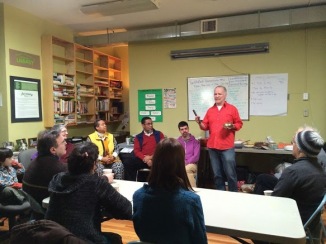by Amy Outlaw Kietzman
Recently, after collecting my local CSA share, I began thinking about really local produce and decided to visit the various “farms” and produce stands actually in West Philly. What I found was pretty cool. There are, at least, 6 in West (and Southwest) Philly that sell produce at their own Farm Stands. Some also sell at farmer’s markets or through venues such as our very own Mariposa Coop. I was able to visit three of them: Earth’s Keepers at 51st and Kingsessing, Urban Tree Connection, at 53rd and Poplar and The Farm at Bartram’s Garden at 54th and Lindberg Blvd.
Earth’s Keepers is right next to the Library on 51st Street (between Chester and Kingsessing) It not only has 12 raised beds of vegetables, a strawberry patch and an orchard, it also has a passive solar heated hoop house for extending the growing season. I bought kale and okra there- both were outstanding. You can stop by there Monday through Thursday, 4-6:00 PM to buy great, really local produce. The program has worked with and trained many high and middle schoolers in gardening/farming skills, as well as nutrition and healthy food preparation. Alia Walker is the coordinator and head farmer/educator.
After taking some fotos and buying vegetables I sat down to chat with a volunteer, Dr. Bev. She asked me how I liked to prepare okra and I readily replied that my current way is to cut them lengthwise down the middle and stir-fry them in olive oil. She smiled and surprisingly told me she ate her’s raw, dipped in hummus or any other good dip! She said she would never try this with store-bought okra, only with the fresh, young okra like you can get at Earth’s Keepers. (I did try it when I got home and it was, indeed, tasty!)

My next visit was to the Urban Tree Connection Farm. I was met there by Stan, the director who has been with the project since its inception 15 years ago. Back then is was a response to the drug related killings of six young men from the neighborhood which was pocked with abandoned lots full of rubble and overgrown with trash and weeds. One of the larger lots was obtained and with the community’s help turned into a memorial park, with a small stage, open grass and beautiful shrubs. Stan was a professor of architecture at UPENN previously, who left that profession to address the problems in his community. He was not a farmer, or even a gardener, so when someone suggested adding a few raised beds to lot adjoining the original memorial park, he declined. Overtime he was convinced to give it a try and 8 years ago UTC (UrbanTree Connection) got volunteers to install several raised beds.
That’s when they came out of the woodwork! Several older women from the surrounding homes came out to give advice and eventually to have beds of their own. Following that, those same women started beautifying the small gardens right outside their homes and the whole block of houses began to seem more like garden apartments than subsidized housing. There is now an actual farm in the center of one block, that employs two farmers and 8 neighborhood youth every summer. Stan repot that the farm sells $46,00.00 of produce a year; some at their own stand (at reduced prices for neighborhood folk), at the Rittenhouse Square Farmer’s Market, and to local farm to table restaurants!
Last, but not least, I visited The Farm at Bartram’s Garden. Its full name is The Farm and Community Resource Center. This is the largest of the local, local farms. It has an orchard, a large raspberry patch, an actual 4 acre field where many vegetable grow, a passive solar hoop house and oversees approximately 10 raised beds that community members can “rent” for $15.00 a season. The raised beds fee comes with replenished soil, the use of tools and some seedlings, so it is a pretty good deal. They work in collaboration with several groups; Parks and Recreation, the Horticultural Society and the Urban Nutrition Initiative (UNI). Through UNI many neighborhood youth get experience farming and selling produce as well as nutrition and cooking.
I hope to make visits to the other 3 farms soon. Here is a list of where and when to buy the excellent, super local produce from farm stands just a block or 3 away from where you live!
Walnut Hill Community Farm Stand
4610 Market Street, Thursdays, 4-7:00 PM, May through November
Earth’s Keepers Farm Stand
51st and Kingsesssing Avenue, Monday-Thursday 4:00-6:00 PM
Farm 51 Produce Stand
51st and Chester Avenue, Thursdays, 4:30-7:00 PM, May to November
Fresh produce and eggs
Mill Creek Farm Produce Stand
49th and Brown Streets, Saturdays, 11:00 AM-2:00 PM, And Wednesdays at the Haddington Farmer’s Market, 52nd and Haverford Avenue, 1:00-5:00 PM
Bartram’s Garden Farm Stand
(The Community Farm & Resource Center)
54th and Lindbergh Blvd, Thursdays, 3:30-6:30 PM, June through October
Urban Tree Connection Farm Produce Stand
53rd and Poplar Sts. Saturdays, 11:00 AM-2:00 PM









